Diplomatic Bluebook 2016
Chapter 2
Japan’s Foreign Policy that Takes a Panoramic Perspective of the World Map
2.Situation of Sub-Saharan Africa and Japan’s efforts
(1) African Union (AU)
The 24th African Union (AU) Summit was held in Addis Ababa (Ethiopia) in January. At the Summit, the participants had discussions under the theme of “Women’s Empowerment,” and Zimbabwe was elected as Chair for the Summit in 2015. Furthermore, the “AU Agenda 2063” was adopted, which outlines the agenda for the integration and development of Africa for the next fifty years. The Parliamentary Vice-Minister for Foreign Affairs Uto attended the AU Summit as a representative of Japan, and met with a number of African dignitaries. He also participated in a stakeholders meeting on Ebola virus disease, organized on the occasion of the AU Summit, and explained Japan’s efforts, which African countries highly appreciated.
(2) East Africa
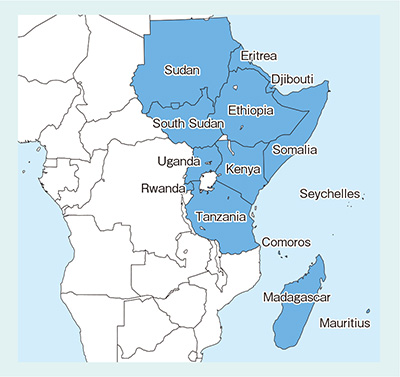
A. Uganda
Uganda is one of the major countries in East Africa, where the Museveni administration is governing the country with stability with high potential in trade and investment, including future oil field development.
In September, President Museveni and his spouse paid an Official Working Visit to Japan. Their Majesties the Emperor and Empress had a meeting with President Museveni and his spouse, and hosted a Court Luncheon. Prime Minister Abe and President Museveni held a summit meeting and signed a joint statement. President Museveni and his spouse interacted with stakeholders from various circles in Japan, including business-related parties. The visit ended as important opportunity to further deepen the friendly and cooperative relations between Japan and Uganda.
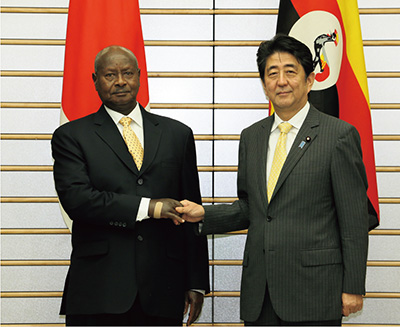 Prime Minister Abe shaking hands with President Museveni of Uganda at the Japan-Uganda summit meeting (September 10, Tokyo; Photo: Cabinet Public Relations Office)
Prime Minister Abe shaking hands with President Museveni of Uganda at the Japan-Uganda summit meeting (September 10, Tokyo; Photo: Cabinet Public Relations Office)B. Ethiopia
In Ethiopia, a general election took place in May. The ruling party won a complete victory, and Prime Minister Hailemariam was reappointed in October. The government worked out the next Growth and Transformation Plan (GTP2) against the backdrop of strong economic growth, and has been advancing the transformation of economic structure for industrialization.
In relationship with Japan, Ethiopian Airlines started its scheduled flight service to Narita International Airport in April. In September, the Africa-Japan Business Investment Forum was held in Addis Ababa. Furthermore, the Japan External Trade Organization (JETRO) decided to establish an office in Addis Ababa, and Prime Minister Abe conveyed this information to Prime Minister Hailemariam on the occasion of the UN General Assembly in September, thereby deepening economic relations. In December, Foreign Minister Tedros visited Japan to attend an international conference entitled “Universal Health Coverage in the New Development Era: Toward Building Resilient and Sustainable Health Systems,” and met with Foreign Minister Kishida. The two ministers agreed on strengthening economic relations and cooperating toward TICAD VI.
C. Kenya
In Kenya, the Jubilee Coalition between President Kenyatta and Vice President Ruto, under their stable governance, has been promoting domestic reforms toward the achievement of the Vision 2030 as a social development goal. The economy is also performing steadily as a driving force of the East African economy. However, urgent countermeasures are required against terrorism, such as the Garissa University attack incident by the al-Qaida-based Islamic extremist organization “Al-Shabaab (AS)” (April), and other general crimes. The international community including Japan is continuing support for the national reconstruction of Somalia and its peace and stability.
As for the relationship with Japan, a summit meeting between President Kenyatta and Prime Minister Abe was held on the occasions of the Third United Nations World Conference on Disaster Risk Reduction (March) and the United Nations General Assembly (September). There were also frequent VIP visits between both countries. With TICAD VI to be held in Nairobi in August 2016, the bilateral relations are expected to be further strengthened.
D. Djibouti
Djibouti is situated at a strategic point where important sea lanes connect Europe with the Indian Ocean and Asia through the Mediterranean, the Suez Canal and the Red Sea. Furthermore, the country is an important stable nation, despite being located in the “Horn of Africa” where unstable factors persist.
Japan has been implementing anti-piracy activities off the coast of Somalia and in the Gulf of Aden since 2009. In 2011, the Self-Defense Force started the operationalization of its installation for an efficient operation of activity troops. The activities of various countries troops including the Self-Defense Force have contributed significantly to reducing the number of piracy incidents in that sea area. Several high-level visits were made from both sides, including a visit to Djibouti by Parliamentary Vice-Minister for Foreign Affairs Uto (May), a visit to Japan by Djibouti’s National Assembly Chairman Mohamed (May) and a visit to Djibouti by Parliamentary Vice-Minister for Foreign Affairs Hitoshi Kikawada (December).
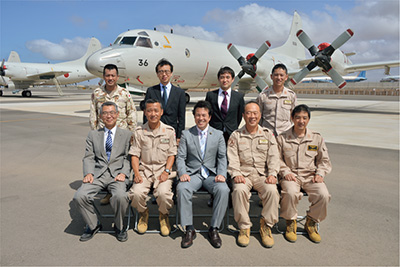 Parliamentary Vice-Minister for Foreign Affairs Uto visiting the installation of the Self Defense Force in Djibouti (May 3, Djibouti)
Parliamentary Vice-Minister for Foreign Affairs Uto visiting the installation of the Self Defense Force in Djibouti (May 3, Djibouti)E. Seychelles
The Seychelles, an island country consisting of 115 islands, is located at a strategic point connecting the African continent with India. At the presidential election held in December, the incumbent President Michel was elected for the third time.
In relation with Japan, State Minister for Foreign Affairs Kiuchi visited the Seychelles in August. He exchanged views with high-ranking government officials including the President, and visited the site of a project that was implemented through Japan’s official development assistance (ODA). This visit ended up being a historic opportunity to further deepen the bilateral relationship.
F. Tanzania
Tanzania has attracted attention as a promising trade and investment destination because of its stable government, economic growth and geographical importance as one of the gateways to East Africa. In October, a presidential election took place, and President Magufuli was sworn in.
In relationship with Japan, Prime Minister Pinda visited Japan in March to attend the Third United Nations World Conference on Disaster Risk Reduction and met with Prime Minister Abe. In December, State Minister for Foreign Affairs Kihara visited Tanzania to meet with President Magufuri and Foreign Minister Mahiga. Both political and economic relations progressed as illustrated by the 2nd round negotiations for the Japan-Tanzania Investment Treaty held in Tokyo in August.
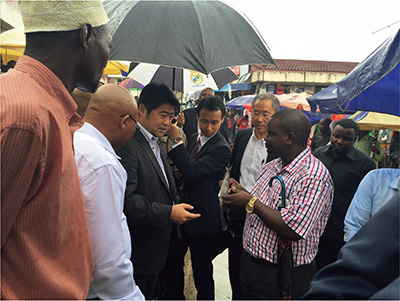 State Minister for Foreign Affairs Kihara receiving an explanation at the fish market supported by Japan (December, Dar es Salaam, Tanzania)
State Minister for Foreign Affairs Kihara receiving an explanation at the fish market supported by Japan (December, Dar es Salaam, Tanzania)G. South Sudan
In South Sudan, as a result of the mediation talks conducted by the Intergovernmental Authority on Development (IGAD) and others in August, the parties concerned signed an Agreement on the Resolution of the Conflict in the Republic of South Sudan, facilitating the efforts for the stabilization of South Sudan.
Japan has dispatched the Self Defense Force to the UN Mission in the Republic of South Sudan (UNMISS) to support creating an environment to enable infrastructure development and humanitarian assistance, based on the principle of proactive contribution to peace. Japan also implements ODA projects for infrastructure development, agriculture promotion and human resources development to contribute to medium- and long-term development and the improvement of resilience. In May, Parliamentary Vice-Minister for Foreign Affairs Uto and Parliamentary Vice-Minister of Defense Ishikawa together met with Vice President Igga to convey concerns about the situation in South Sudan and encourage the promotion of the political process.
(3) Southern Africa
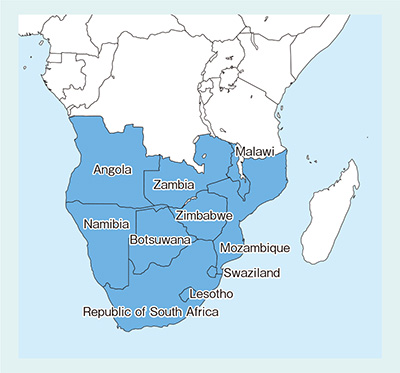
A. Angola
Angola is blessed with energy and mineral resources, such as oil and diamonds, and has been achieving high growth in recent years. Meanwhile, the Government of Angola has set the diversification of the economy as an urgent issue of the country, due to the recent decline of oil prices.
Furthermore, Angola has been serving as a UN Security Council non-permanent member since 2015 for a term of two years. In 2016, Angola serves as a Security Council member together with Japan.
In March, a Japan-Angola business forum was held in Luanda, and 37 companies and about 120 people participated in the form. In July, Japan and Angola signed an Exchange of Note of agreement of approximately 200 million US dollars, the first yen loan for the country. Close relations are being built between the two countries at both public and private levels through the visits to Japan by Finance Minister Manuel (August), Social Welfare and Reintegration Minister Kussumua (November) and Economic Minister Gourgel (December).
B. Zimbabwe
Zimbabwe had a sluggish economy since 2000, due to the political and economic turmoil as well as sanctions by the EU and the U.S. However, since 2009, the political and economic situation has calmed down to a certain extent, and is showing signs of improvement, with the scaling down of sanctions by the U.S. and the EU. Japan decided the resumption of bilateral grant aid and technical cooperation in 2010. Japan Overseas Cooperation Volunteers (JOCV) was dispatched in 2011.
On the occasion of the Third United Nations World Conference on Disaster Risk Reduction (March), a summit meeting was held between President Mugabe and Prime Minister Abe. In September, Parliamentary Vice-Minister for Foreign Affairs Nakane visited Zimbabwe to pay a courtesy call on President Mugabe. He also met with Foreign Minister Mumbengegui, leading to a further strengthening of the bilateral relationship. In January, general project grant aid was provided to Zimbabwe for the first time in 15 years.
C. Namibia
Namibia celebrated the 25th anniversary of independence in 2015. With rich marine and mineral resources and the geographical advantage which has potential to be a logistic gateway on the Atlantic Ocean side in South Africa, Namibia expects the expansion in trade and investment (in particular in resource development and energy sectors).
The Embassy of Japan in Namibia was opened in January. In March, Parliamentary Vice-Minister for Foreign Affairs Nakane visited Namibia to attend the ceremony commemorating the 25th anniversary of independence and the inauguration of the new President as a special envoy of the Prime Minister, and met with Vice President Iyanbo.
D. Botswana
Since its independence in 1996, Botswana has been politically stable with good governance. Botswana is well known for its diamond output (World No.1) and wild animals and plants in the wetlands. Also, Botswana is the only country that adopted the Japanese system of digital terrestrial television in Africa.
Parliamentary Vice-Minister for Foreign Affairs Kikawada visited Botswana in December, and met with high-ranking government officials including Vice President Masisi and Minister of Foreign Affairs and International Cooperation, Moitoi, agreeing to further strengthen the relations between the two countries.
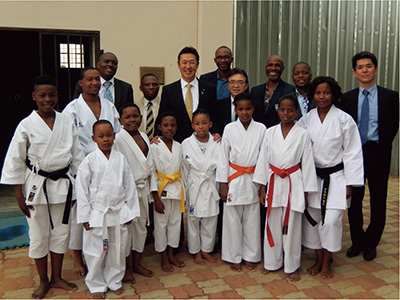 Parliamentary Vice-Minister for Foreign Affairs Kikawada visiting a karate dojo (training hall) in Botswana (December 11, Botswana)
Parliamentary Vice-Minister for Foreign Affairs Kikawada visiting a karate dojo (training hall) in Botswana (December 11, Botswana)E. Republic of South Africa
The Republic of South Africa, despite the slowdown of economic growth in recent years, continues to attract attention from many foreign companies, as a major economic power in Sub-Saharan Africa and as a business development base, allowing access to the region.
Vice President Ramaphosa visited Japan in August to pay a courtesy call on Prime Minister Abe. He also attended the luncheon hosted by Deputy Prime Minister and Minister of Finance Aso, as well as a roundtable talk with ABE Initiative1 trainees. The Vice President praised the past contribution by Japan and Japanese companies in facilitating job creation, human resource development and a national development plan, and expressed expectations for further efforts as well.
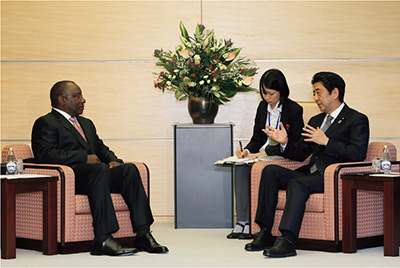 Prime Minister Abe receiving a courtesy call from Vice President Ramaphosa of Republic of the South Africa (August 24, Tokyo; Photo: Cabinet Public Relations Office)
Prime Minister Abe receiving a courtesy call from Vice President Ramaphosa of Republic of the South Africa (August 24, Tokyo; Photo: Cabinet Public Relations Office)- 1 ABE Initiative
Announced by Prime Minister Abe in June 2013 as support measures for TICAD V. The initiative is intended to invite 1,000 African youths to Japan over five years, and provide them with opportunities for education at Japanese universities and graduate schools and internships at Japanese companies. It is hoped that this initiative will help develop human resources in the industrial field in Africa and create connections and networks between African human resources and Japanese companies, whereby African youths are expected to contribute as African business pilots to Japanese companies entering into the African market.
F. Mozambique
Mozambique has been achieving a high economic growth in recent years, thanks to the discovery of resources such as natural gas and coal, and attracts attention worldwide as a new investment destination.
Mr. Ichiro Aisawa, a member of the House of Representatives (President of Japan-African Union (AU) Parliamentary Friendship League), participated as a special envoy of the Prime Minister in the presidential inauguration of President Nyushi in January, and exchanged views toward the enhancement of relations between the two countries in the meeting with the President.
(4) Central Africa
A. Central African Republic
While Central African Republic remained unstable, the interim government advanced a process to return to democracy with the help of the international community. In May, the Bangui Forum for national reconciliation was held successfully, and a number of armed movements agreed to release child soldiers. The election schedule was announced in June, raising the momentum to restore democracy, but a large-scale unrest occurred in the capital Bangui in September, which forced the elections scheduled for October to be postponed to December. The referendum on the draft Constitution and the first round of the presidential election took place in December in a generally peaceful manner.
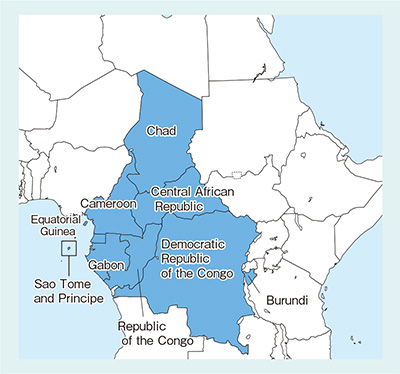
Japan has carried out a variety of support through international organizations to improve the humanitarian situation and ensure the smooth implementation of the process to restore democracy in the Central African Republic.
B. Burundi
Since April, clashes occurred mainly in Bujumbura between the demonstrators and the police force over the eligibility of the re-election of President Nkurunziza of Burundi, destabilizing the country. In May, the Constitutional Court decided the constitutionality of the third term of presidency. When the President expressed his candidacy for the election, a riot broke out by the forces opposed to his candidacy. In July, while the opposition parties were boycotting, the presidential election was held in the face of international condemnation, and the President was elected. Even thereafter, confusion has continued as seen in raids on security forces and murders of citizens in the capital Bujumbura.
(5) West Africa
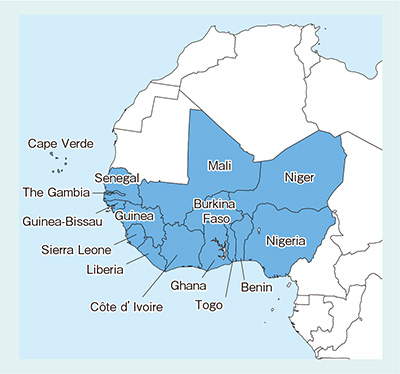
A. Côte d’Ivoire
In Côte d’Ivoire, national reconciliation and economic reconstruction is in progress under President Ouattara after an era of confusion of about 10 years. The presidential election was carried out in a democratic and peaceful manner in October, and the President was re-elected. This gave an impression that the era of crisis is over in the country. Japan provided equipment and materials such as ballot boxes, contributing to the smooth implementation of the election.
Furthermore, Japan continued its efforts to boost Africa’s growth, through such projects as the project for Improvement of the Japan-Ivorian Friendship Intersection and support for the private sector in Africa in coordination with the African Development Bank, whose headquarters is located in Abidjan.
B. Senegal
Senegal is a stable country in West Africa, and serves as a United Nations Security Council non-permanent member together with Japan for a two-year term starting 2016.
Parliamentary Vice-Minister for Foreign Affairs Uto and Parliamentary Vice-Minister for Foreign Affairs Hamachi visited Senegal respectively (March/November) to exchange views with President Sall and Foreign Minister Ndiaye. Furthermore, Parliamentary Vice-Minister for Foreign Affairs Hamachi attended the 2nd “Dakar International Forum on Peace and Security in Africa.” At its plenary meeting, he introduced Japan’s contribution to peace and stability in Africa including the Sahel region. He also expressed the determination to further contribute to peace and stability in the international community, given Japan’s non-permanent membership in the UN Security Council from 2016, the G7 Presidency in 2016 and TICAD VI.
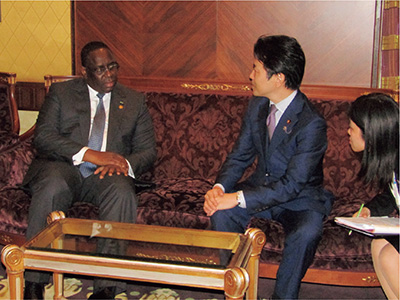 Parliamentary Vice-Minister for Foreign Affairs Hamachi paying a courtesy call on President Sall of Senegal (November 9, Dakar, Senegal)
Parliamentary Vice-Minister for Foreign Affairs Hamachi paying a courtesy call on President Sall of Senegal (November 9, Dakar, Senegal)C. Nigeria
Nigeria has the largest population and economic scale in Africa, with an influential voice in Africa. Following the presidential election in March, President Buhari was sworn in, which was the first change of administration by democratic procedures. Meanwhile, Boko Haram, an Islamic extremist group, with repeating acts of terrorism mainly in the northeast of the country, countermeasures against this group have become a challenge involving neighboring countries.
In May, member of the House of Representatives, Aisawa was dispatched to the presidential inauguration ceremony as a special envoy of the Prime Minister. Although the deterioration of the economy due to a fall in resource prices is a concern, Japanese companies continue to show high interest in Nigeria. In November, an international trade fair was organized in Lagos, the economic capital of Nigeria, and more than 30 Japanese companies participated.
D. Niger
In Niger, while a general election is scheduled in 2016, the security situation has deteriorated not only in the north where Islamic extremist militants are rampant, but also in the southeast where Boko Haram repeats cross-border attacks from Nigeria.
In June, President Issoufou made a working visit to Japan, the first visit by a head of state from Niger in 29 years. At the summit meeting with Prime Minister Abe, the two leaders agreed to strengthen cooperation in counter-terrorism and security measures and in the field of social and economic development, based on the principle of proactive contribution to peace, with Niger, which is located on the node of North Africa and the Sahel region, where an unstable situation continues.
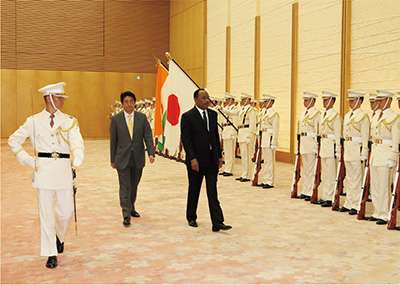 Ceremony by the guard of honor on the occasion of a visit to Japan of President Issoufou of Niger (June 19, Prime Minister’s Office, Tokyo; Photo: Cabinet Public Relations Office)
Ceremony by the guard of honor on the occasion of a visit to Japan of President Issoufou of Niger (June 19, Prime Minister’s Office, Tokyo; Photo: Cabinet Public Relations Office)E. Benin
Benin is said to be a model country for democracy in West Africa.
In August, State Minister for Foreign Affairs Kiuchi visited Benin to attend the ceremony commemorating the 55th anniversary of independence, and to pay a courtesy call on President Yayi and Foreign Minister Akadiri.
F. Liberia
Since the end of the civil war in 2003, which had lasted for approximately 14 years, Liberia has been working on the reconstruction of its national economy and society. The economy was continuing to grow steadily, but the country suffered serious damage again in 2014, this time from the outbreak of Ebola virus disease. The reconstruction plan of the economic and social system is in progress, including the enhancement of the health care system.
President Sirleaf visited Japan in August, and met with Prime Minister Abe. She also gave a keynote speech at “WAW! 2015” (World Assembly for Women). In September, the first Japan-Liberia policy dialogue was held in Monrovia. Visits between the two countries are becoming active, including a visit of Commerce and Industry Minister Addy to Japan in November.
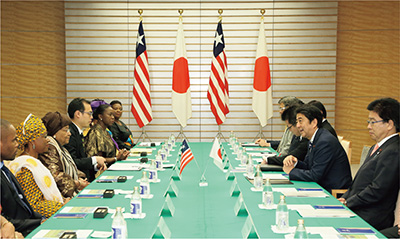 Japan-Liberia summit meeting (August 27, Tokyo; Photo: Cabinet Public Relations Office)
Japan-Liberia summit meeting (August 27, Tokyo; Photo: Cabinet Public Relations Office)